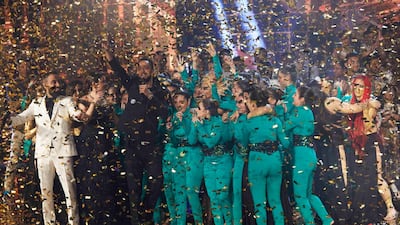Lebanese dance company Mayyas are causing a stir – both regionally and internationally. After winning the sixth season of Arabs Got Talent in April – the first act from Lebanon to do so – the crew recently made their debut international performance as part of Britain's Got Talent: The Champions.
A spin-off of the British talent show, the series features a variety of former international winners, finalists and participants facing off with each other, with one winner declared champion at the end.
Mayyas were one of 45 acts who competed in a pool that featured talent from the UK, India, the Philippines, South Africa, Spain, Singapore and other countries. While they didn't make it to the finals, the all-woman crew certainly left an impression. In addition to a rapturous standing ovation from the audience, English television mogul Simon Cowell – who was on the judging panel – was moved enough to hail their performance as "genius".
Now back in their Beirut studio, Mayyas are working on developing their craft. While no further public shows are booked yet (the group will travel to the UAE for a corporate gig later in the year), the company's choreographer Nadim Cherfan says the group are working hard to deliver an exciting new production. However, he says in order to truly shine, Mayyas must overcome some regional perceptions.
How important a step was it for Mayyas to appear in Britain’s Got Talent: The Champions?
As we come from a very small and troubled country, it was daunting at first for us to even think about performing on such a big stage in front of an international audience of thousands, let alone under the discerning eyes of the esteemed panel, especially Mr Cowell. But we are as much believers as we are serious dreamers. We are one team with one pulse, with much love, respect and trust for one another. Our chemistry is undeniable. And I believe this is what helped us put our best foot forward and manage a performance that was well received by many.
Your performance in the show was heavily inspired by the region. As the group’s choreographer, what were you aiming for with the routine?
We chose to compose a tableau that was an amalgam of our previous work on Arabs Got Talent, but we integrated an underlying story, a subject much written about by the Orientalist school, in the hopes of relevance to the British audience: the allure of the orient of old, the mystique of Arabia and the powerful nurturing role of women in the ancient past where their gentle force was a core belief.
How did the fortunes of Mayyas change after you won ‘Arabs Got Talent’?
Well, we received a lot of interest. But the very first thing we often hear from organisers is: "there is no budget; but we are giving you exposure instead". It is sad to witness that many people do not get our philosophy, and only seek to exploit the beauty of our work for mere self-serving purposes, solely towards the success of their events. It is callous. But also, there are many who appreciate us and believe in us, and that makes a world of a difference. We also hope to establish our own academy with the proceeds that we will be making in the future. We just need to persevere and keep believing and training our socks off, of course.
You won ‘Arabs Got Talent’ and performed internationally. What is it that drives Mayyas now?
Although Mayyas is not a seasoned professional dance company, we aspire to offer a different take on the art of movement. For us, it is an emotionally effective vehicle to communicate with our audiences. Through pleasantly engaging visuals, colours, sounds and an undulating collective flow, we seek to capture the crowd for a few moments, and transport them to a dreamy dimension. We aim to break the current stereotype in some parts of the region that dance is lowly or indecent, as it is the oldest form of expression and is inherent to the fabric of human folklore. Dance doesn't mean seduction. I mean, is the haka or the dabke viewed that way?


